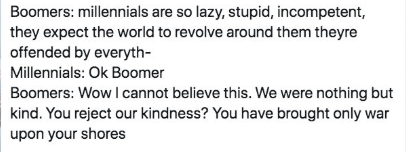“Ok, boomer”: a mocking clap-back directed towards the stereotype surrounding Baby Boomers
The “Ok, boomer” epidemic as infected younger generations as it appears innocent enough. It’s just a meme, right? It is just a Tik Tok challenge, right? Although “Ok, boomer,” seems innocent enough due to its presence in social media, this statement is more so a reflection of milennials’ and younger generations’ inability (and desire) to effectively communicate with older generations.
The Birth
The concept of respecting the older generations in our society has been upheld until now. Although the phrase is said to have been produced in January of 2019, the popularity of “Ok, boomer” surged in November of 2019 as it bombarded headlines of well-known newspapers such as The New York Times. Quickly following its birth, the catchphrase parachuted down to young, impressionable audiences on Tik Tok and other forms of media.
But we need to talk . . .
The concept of respecting the older generations in our society has been upheld until now. We have all heard, “Respect your elders,” right? But the loose definition of “respect” is what influences the decisions of our society’s youth. Milennials’ voices have been gradually silenced, causing milennials to resort to blunt, rude statements to fight back the opposing argument. Sure, the comeback is quick and may seem to settle an argument, but in actuality, this only perpetuates the cycle of inter-generational wars.
Yes, the memes are hilarious because of their stereotypical nature. Yes, some of the comeback tweets are hilarious because of the ridiculous nature of the initial comment. However, this does not justify using this phrase in genuine, face-to-face contact or in an excessive manner.
What do we do?
Hopefully in 2020 us Generation Z’s can abandon our bandwagon nature, Milennials can abandon their habit of dissociation, and Baby Boomers can accept arguments other than their own.










